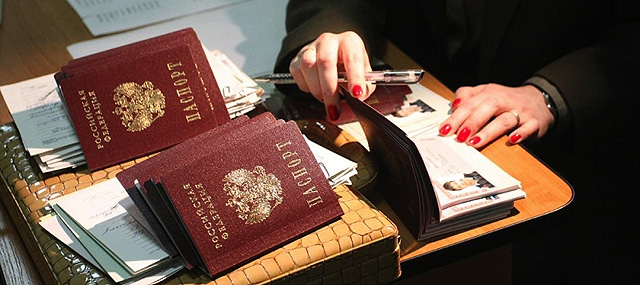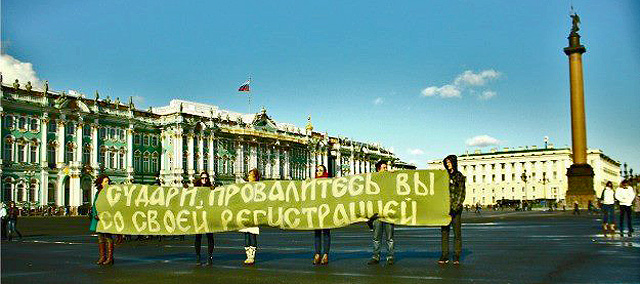The Russian government must keep its people
in a state of perpetual wonder.
Mikhail Saltykov-Shchedrin
At Vladimir Putin’s request, Russian lawmakers are toughening the rules on residency registration and criminal liability for violating them. According to IMR Advisor Ekaterina Mishina, a prominent Russian legal scholar, the new amendments would de facto annul the priority of rights over obligations that is enshrined in the Russian Constitution.

Without fail, every December in Russia, the legislators' lawmaking activity intensifies. Sometimes they happen to adopt something good, as they did in 2011 by introducing amendments to the Criminal Code, which removed criminal liability for defamation and insult. One should also thank them if they adopt something reassuring (even if the consequences are not yet clear), like the law on control over officials' income and expenses adopted in late 2012.
But it also happens that they present us with ugly surprises for Christmas or New Year. For example, in 2008, despite protests from the Public Chamber and human rights organizations, crimes directed against the state (such as terrorism, extremism, high treason and espionage) were eliminated from the already-limited jurisdiction of jury trials. More recently, those making Russia’s laws show themselves indifferent if not hostile to the concept of individual rights embedded in the Constitution.
This attitude was on display again on December 29, 2012, when the president sent the State Duma a bill regarding changes to Russia’s law “On the Rights of Citizens of the Russian Federation to Freedom of Movement, Choice of Place of Sojourn and Residence within the Russian Federation.” The bill was accompanied with the usual legal paraphernalia of citations and references to the government, the Supreme Court, and other official bodies. The following sentence concluded the cover letter addressed to Duma Speaker Sergei Naryshkin: "I believe that the attached federal bill should be considered by the State Duma on a first-priority basis". The sympathetic Duma instantly realized the issue's urgency: on January 9, 2013, right after the holidays, the bill itself and all the attached documents were registered and sent to the speaker. On February 15, the bill was passed on the first reading.
As many have commented, the bill is terrible both in substance and in the possible consequences of its implementation. (I will not ask the question about the bill's potential for fueling corruption because the answer is evident.) However, as it introduces criminal liability for fictitious registration of Russian and foreign citizens or stateless people (the proposed version of Art. 322-2 of the Criminal Code), as well as for fictitious registration of foreign citizens or stateless people at a location in the Russian Federation (the proposed version of Art. 322-3 of the Criminal Code), it is time to use the categories of criminal law and to think about the legislators' real intention. It is not how well the legislators deliberated, but whether they deliberately sought the socially dangerous consequences of the bill’s adoption. As is well known, the devil is in the details, even if, in this case, there is no devil, just many Soviet-style imps.
It is time to think whether the legislators deliberately sought the socially dangerous consequences of the bill’s adoption.
The legislative intent for the bill is stated with appealing frankness in the explanatory note: "Hundreds of thousands of people register each year in thousands of so-called ‘rubber homes’ in Russia with no intention of living at the locations. At the same time their real place of residence is not known. In 2011 alone, nearly 300,000 people were registered at only 6,400 addresses. By exercising their right to choose the place of residence, many citizens are shirking their constitutional duties to other citizens, the state and society." The note adds: "this situation became possible due to massive abuse by homeowners of their property rights, often for material motives." One does not have to look further for the bill’s real intentions than its authors’ own words. The exercise by citizens of their constitutional rights is either grimly portrayed, as in the case with homeowners, or considered an obstacle that prevents one from fulfilling his or her "constitutional duties to other citizens, the state and society." This approach to rights and duties requires further discussion.
There are actions that one cannot complete on their own without a partner. For example, no matter how one tries, one cannot kiss oneself on the lips. The "massive abuse of property rights" by insidious homeowners would never happen or be of concern if corrupt officials were not willing to approve the temporary registrations. Without the latter, malevolent homeowners could do no more than try to conjure cunning plans for registering hundreds of labor migrants from the former Soviet republics in their homes. If such intentions were cut short by officials whose responsibility it is to issue temporary registration, there would be no abuse. But given today's corruption, one can only dream of it. "Our luck will hold for as long as there are greedy people around.”1
The notion that by exercising their right to choose their place of residence, citizens are shirking their "constitutional duties to other citizens, the state and society" does not stand up to criticism from the point of view both of constitutional law and reason. In Russia, the only the duty of a citizen to other citizens is established by Article 17, Part 3 of the Constitution: "The exercise of human and civil rights and freedoms must not violate the rights and freedoms of other people." What rights and freedoms do people violate by registering in people in so-called “rubber homes" in Russia with no intention of living at those locations? As the law’s explanatory note emphasizes, these people do not live at the aforementioned locations, and the real place of their residence is unknown. If that is true, what difference does it really make how many people have been registered by that crafty Vasya in his apartment on the fourth floor? The worst suffering it could cause would be to make us quietly weep from envy at the thought of all that money our resourceful neighbor has made on temporary registrations. I cannot think of any modern state protecting the freedom of envy in its Constitution.

The amendments toughening residency registration rules have already led to protests from civic activists (this sarcastically polite banner reads: "Go away, gentlemen, with your registration.")
The bill's framework created by its authors is dangerous because it is aimed at abolishing the supremacy of a person's rights and freedoms—and accentuating his or her responsibilities. Here, the bill's authors trample the Constitution, in particular, its Article 2, which clearly states that: "Man, his rights and freedoms shall be the supreme value. The recognition, observance and protection of human and civil rights and freedoms shall be an obligation of the State." Indeed, a man's rights and freedoms and not his duties, because rights and freedoms are foremost, both historically and due to their significance. Constitutional obligations for individuals are "younger" than constitutional rights by almost two centuries, and they began acquiring a legal expression only after the Second World War. In constitutional law courses, they teach that the traditional obligations, which the state implicitly or openly places on its citizens, consists of compliance with laws and other statutory acts, the obligation to pay taxes and the duty to serve in the military. In modern constitutions one can see not only the term "citizens' obligations" itself, but even whole chapters and sections dedicated to this subject (for example, Part I of the Italian Constitution on "Rights and duties of citizens;" Title III of the Venezuelan Constitution on "Duties, human rights and guarantees;" Title III of the Constitution of Panama on "Individual and social rights and duties;" Part I, Chapter 2, Division 2 of the Spanish Constitution on "Rights and Duties of Citizens.")
Some constitutions provide that each citizen has a duty to work. Thus, the Constitution of Costa Rica reads: "Labor is a right of the individual and an obligation to society. The State shall strive to see that everyone has lawful and useful employment...." (Art. 56) The Constitution of Spain says: "All Spaniards have the duty to work and the right to work...." (Section 35)2 Similar provisions are included in the Constitutions of Panama, Uruguay, Japan, the Gabonese Republic and others. Despite its declarative nature, this duty is a democratic one because it strengthens the legal position of workers in the struggle against unemployment.
The bill's framework created by its authors is aimed at abolishing the supremacy of a person's rights and freedoms—and accentuating his or her responsibilities.
The declaration of the duty to care about children is common practice. For example, the Constitution of Italy states: "It is the duty and right of parents to support, raise and educate their children, even if born out of wedlock."
The Russian Constitution provides for the following responsibilities of citizens to the state:
- Everyone is obligated to pay legally established taxes and levies. Laws, which establish new taxes or worsen the position of taxpayers, shall not have retroactive force. (Art. 57)
- Everyone shall have the duty to preserve nature and the environment and to treat natural resources with care. (Art. 58)
- Defense of the Fatherland shall be the duty and obligation of each citizen of the Russian Federation. (Art. 59)
I can affirm that the full-scale exercise by citizens of their rights and freedoms does not at all prevent them from defending their Fatherland, paying taxes, protecting the environment and natural resources. The bill’s proposed restrictions on freedom of movement will in no way encourage citizens to comply with their obligations to the state—the tax collection and the ecological situation in the country will not improve, and the natural resources that oligarchic rascals have not yet gotten their hands on will not increase. This law would, on the contrary, be a violation of Article 55, Part 2 of the Russian Constitution, which says: "In the Russian Federation no laws must be adopted which abolish or diminish human and civil rights and freedoms."
On the other hand, judging by the latest legislative initiatives and amendments to current statutes, the authorities are not really concerned with upholding the Constitution. They are uneasy with its providing for the primacy of human rights and freedoms. The legislators' tendency is to craft all laws (and other legislative documents) in the manner of the contract in Mikhail Bulgakov's The Theater Novel: every paragraph of that agreement began with the words "the author does not have the right." Paragraph 57 was the only exception—it began with the words "the author shall." Nobody needs this supremacy of human rights and freedoms; it only gets in the way: who cares about its Constitutional protection or the Universal Declaration of Human Rights?
1 A song from Buratino, a popular Russian children’s movie
2 A.A.Mishin, Constitutional (State) Law of Foreign Counties, Statut, Moscow, 2013

